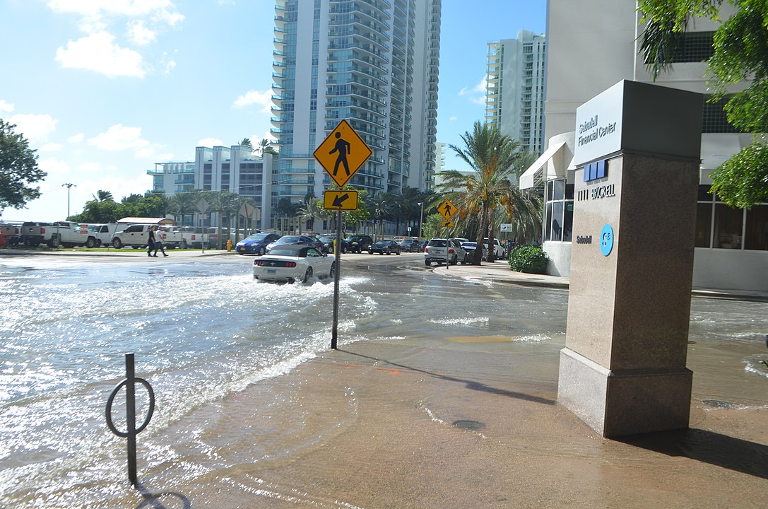When it comes to our own survival in changed circumstances, one of the most dysfunctional things we do as a culture is invest in things. Material things are nice, of course, and their existence and proliferation are one of the markers of civilization, but they have a down side. Things weigh us down, even enslave us if we’re not careful. We begin making decisions based on our stuff, not on more essential elements of life, like people and ideas – like survival.
Think about America’s reactions to sea level rise in Florida. All of the responses we hear about involve the phenomenon called “the psychology of previous investment.” This means that people are reluctant to abandon anything that they’ve put time and money into, even if hanging on to it is a colossally bad idea. In the case of Florida, any sane person since King Canute knows that you can’t stop the ocean. But because individuals, businesses, municipalities, and in fact the whole country have invested billions of dollars in buildings, roads, and theme parks, they try to pretend that there is something they can do about it.
I recently read an excellent book about sea level rise called The Water Will Come. The author reports on prehistoric cultures in seaside areas in what is now Florida. These people apparently didn’t suffer from the same hubris that civilization has created in us. They expected nature to be uncontrollable and built accordingly. They seem to have used various methods, stilts, landfills, and others, to manage living near the wealth that the ocean offered, but they didn’t invest in them too heavily. It was practically and psychologically possible for them to pack up and move when they needed to without losing their culture or their sense of identity. They could easily rebuild somewhere else and still, it seems, be the same people they’d always been. We would, if we could see them, doubtless consider them primitive, but they were adapted to their environment.
Could modern Floridians do that? It doesn’t seem so. I see very little in news and commentary about just packing up and moving. It seems to be a truth universally acknowledged that it can’t and shouldn’t be done. Instead sea walls have to be built, highways raised, pumps installed – more money spent to protect the money that we’ve already spent. This thinking is equally true of individuals, who can’t sell their houses and buy somewhere else, and government officials, who fear they won’t get re-elected if they tell unpalatable truths. The most cynical officials, apparently, don’t even care about the inundation of their state, so long as it happens after they’re gone. Après moi le deluge – literally.
But the problem of Florida being lost to the sea has a solution. I’ll outline it for you, although I anticipate that while reading it you will be thinking, “That’ll never happen. That’s too expensive. We couldn’t agree to that. It’s impractical.” You’re right, what I’ll describe will probably never happen – not because it couldn’t, but because we love our things more than we love our survival.
Imagine that the whole country agrees to invest in moving the communities threatened by sea level rise rather than buttressing them. Local governments in rural communities that have been losing population invite Floridians – and people from Louisiana, New Jersey, and other places – to move there. They make land available through a modern Homestead Act. Businesses in the threatened places, who have accepted that they will soon vanish under the waves, help people to move – they provide trucks, fuel, manpower, construction, advice, banking, and so on, knowing that they themselves will be moving, too, and creating good will and loyalty in the processes. Businesses in the rural areas about to be settled also chip in with infrastructure, employment, and amenities as an investment in their own successful future. The rest of the country helps out through taxes and direct contribution of time, labor, and resources. It wouldn’t take long for new towns and cities to grow in places where they aren’t threatened to be swamped.
Psychology is trickier. How can large groups of people be convinced to leave what they know and start afresh? Even when the means are available, not everyone would be adaptable enough to do so. Not every single person would have to move, of course; this is not a totalitarian state. If a few people choose to stay with their things as the water approaches, that’s an acceptable practice of free will, and the determined and creative ones who stay may in fact be practicing the variety of skills that are essential to the survival of the species.
But when a whole society of millions of people refuses to recognize a looming and obvious threat because they want to hold on to their stuff – that’s when things get crazy. The ostrich with his head in the sand will soon be underwater. This is a time that calls not for deliberate and obtuse materialism but for the ancient virtues that make us human – courage, clear-sightedness, and creativity.
Teaser photo credit: By B137 – Own work, CC BY-SA 4.0





